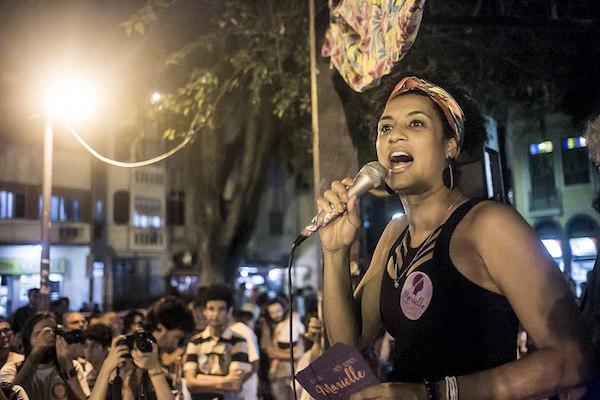by RAFAELA CARDOSO & MARGIT YSTANES
 The late Rio de Janeiro city councilwoman Marielle Franco speaks at a rally in August 2016. PHOTO/Wikimedia Commons/Mídia NINJA
The late Rio de Janeiro city councilwoman Marielle Franco speaks at a rally in August 2016. PHOTO/Wikimedia Commons/Mídia NINJA
What does the assassination of Rio de Janeiro councilmember Marielle Franco—a prominent LGBTQI activist and socialist, outspoken critic of the police, and Rio’s only black councilmember—mean for the future of Brazil?
“Marielle Franco, presente! Agora e sempre! (Now and Always!)”
The words have rung out across streets, plazas, and on social media in Brazil and beyond since Rio de Janeiro councilmember Marielle Franco was brutally assassinated on the evening of March 14 at the age of 38. Franco was on her way home from a meeting in downtown Rio, which focused on black women’s political participation. An unknown car approached Franco’s car, and assailants shot four police-issue bullets into her head. Her driver was also killed. As the only woman on Rio’s City Council to identify as black, feminist, lesbian, favela resident, human rights defender, and activist against police violence, Franco’s political tenure was associated with a broad range of social justice issues. Her death is a severe blow—and a warning—to anyone working to promote such issues in Brazil, particularly from Rio’s marginalized peripheries.
As Franco’s supporters recover from shock and grief, opponents have already begun to defame her on social media, linking her to drug traffickers to tarnish her reputation. Both anonymously through robots, and openly, false claims have been made that the father of Franco’s daughter was a drug trafficker, that Franco won her seat on the City Council because drug traffickers forced residents to vote for her, and that she was killed because she failed to honor her arrangement with them. Most shocking, perhaps, has been the publication of these allegations by Rio’s High Court judge Marília Castro Neves on her Facebook page. This vilification of Franco follows a recurring pattern in Rio de Janeiro: when someone dies at the hands of the police, slanderous claims that the victims were involved in criminal activity often follow.
The assailant in Franco’s assassination has not been caught, but many assume her murder is somehow related to her denunciation of police violence and her critique of a controversial federal military intervention recently introduced in Rio as a public security measure. A Reuters article even quoted an anonymous police officer saying this was a plausible explanation. The intervention, which aims to curb rising street crime and drug-related gang violence, was introduced on February 16, after Brazilian president Michel Temer signed a decree placing the army in charge of Rio’s security forces. This move has produced considerable controversy. Critics say it harkens back to Brazil’s authoritarian past, echoes the increasing nostalgia for military government on the far right, and ignores the failures and violence produced by the militarization of Rio’s favelas ahead of the 2014 FIFA World Cup and 2016 Olympics. According to the daily Extra, homicides and carjacking have actually increased during the first month of the military intervention.
Two days after Franco’s assassination, O Globo reported that the ammunition used to kill her came from a batch sold to the Federal Police in Brasilia in 2006. The Minister of Public Security, Raul Jungman, says the bullets were stolen from the Paraíba headquarters of Brazil’s postal service. Correios issued a statement denying this, and in response, the Ministry of Public Security changed their story–maintaining however, that the bullets in question had been acquired by criminals. Meanwhile, both president Michel Temer and the mainstream media have attempted to use Franco’s assassination as exemplifying the need for the military intervention in Rio, declawing Franco’s critiques of the Brazilian police state.
